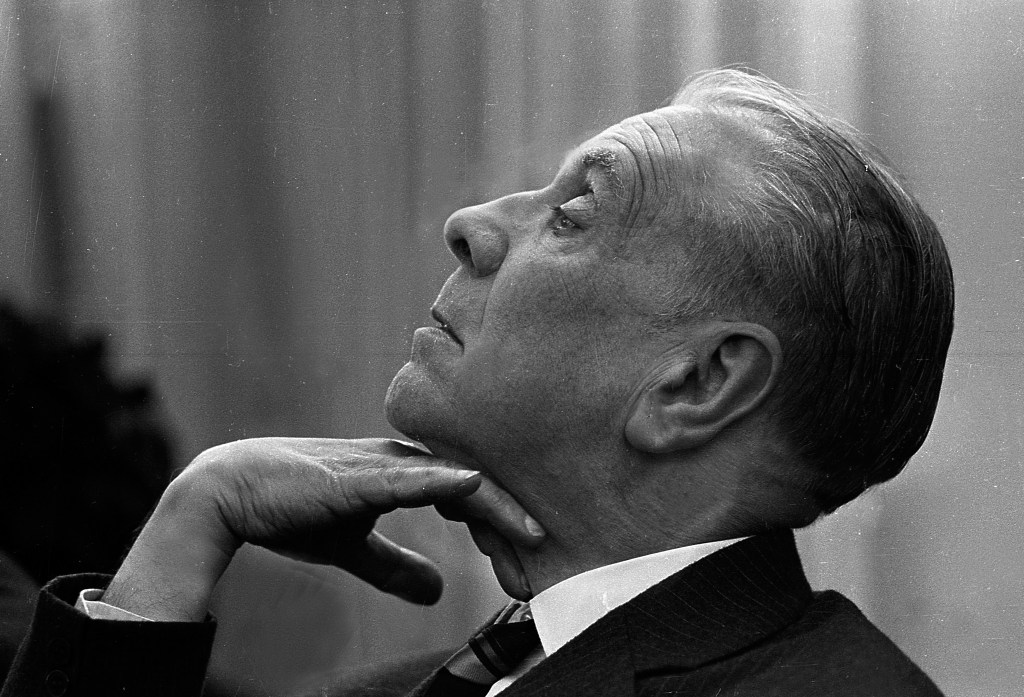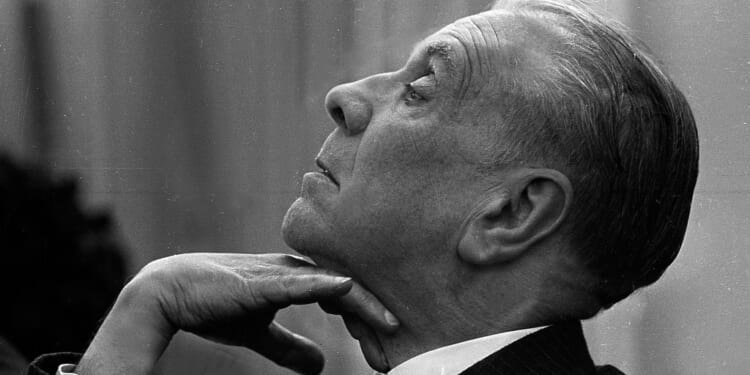
I am not a scholar of Jorge Luis Borges, the Argentine author who co-founded the genre called “magical realism.” I have never read his private letters, or taken graduate courses, or published critical analyses of his work in some unread peer-reviewed journal. But Borges is one of the rare authors in which knowing less about him may benefit the reader, and may even enhance one’s fascination with his stories. That is the only expertise I can truly claim on this topic: I love Borges’ work.
Probably Borges’ most “straightforward” (if I could use multiple pairs of scare quotes, I would) story turned 50 this year. The Book of Sand follows a kind of facsimile of Borges himself—a literary scholar, nearly blind, living in a nondescript Buenos Aires neighborhood. He hears a knock on the door of his fourth-floor apartment and finds a salesman who, at first glance, seems to be prematurely aged. Our protagonist instantly revises this assessment and says that the salesman’s shock of light hair was in fact blond, but seemed “in a Scandinavian sort of way, almost white.” He then tells us this man was from the Scottish Orkney Islands.
The Borges of the story is an unsettling guide: His constant revisions of story-crucial details make it unclear how much he understands what is going on around him. Does our narrator actually perceive that something seems off about the man at the door? Is the narrator lying to us, or fabricating this detail out of nothing? Is he just old and confused, the most heartbreaking possibility of all? Borges gives us no answer.
With a “kind of gloom emanat[ing] from him—and now from me,” the salesman offers up rare Bibles for sale. Upon discovering that this elderly man is a book collector, he pulls out a more bizarre curio. He hands our faux-Borges narrator a book with a wordless cover except on the spine, which says only “Holy Writ. Bombay.” The salesman asks him to put his thumb on the first page. He cannot.
I laid my left hand on the cover and, trying to put my thumb on the flyleaf, I opened the book. It was useless. Every time I tried, a number of pages came between the cover and my thumb. It was as if they kept growing from the book.
“Now find the last page.”
Again I failed. In a voice that was not mine, I barely managed to stammer, “This can’t be.”
Still speaking in a low voice, the stranger said, “It can’t be, but it is. The number of pages in this book is no more or less than infinite. None is the first page, none the last.”
In the story’s final moments, our faux-Borges discovers a halfway decent way to dispose of the mysterious volume (but not destroy it) before it overtakes his mind. But he runs through other possibilities first, which, again, are either amusing or frightening depending on one’s perspective: “I thought of fire, but I feared that the burning of an infinite book might likewise prove infinite and suffocate the planet with smoke.”
Borges was preoccupied with the idea of infinity and how it related to the written word. The Book of Sand is one exploration, but other, better-known stories capture this subject at an even grander scale. There is The Library of Babel, about an infinite underground library filled with books that seem to contain every combination of letters in random order. And then there is the strange tale called Tlön, Uqbar, Orbis Tertius that imagines a society living in the eternal present, where the people literally lack object permanence—a problem we all have as infants, but which our brains take care of with the simple passage of time.
But Borges’ interest in infinity (infinite books, libraries, present) is not a straightforward exercise in “cosmic horror”—that is, a depiction of a godless universe, filled with countless paradoxes of mathematics and science that confound the intellect and emphasize humanity’s smallness. Borges was not narrowly concerned with the intellect (the soul-replacement for the atheist), and still appreciated the mystical and unexplainable parts of the human experience. But his interests weren’t in the cozy or positive visions of spiritual life. Indeed, Borges delights in the “heretical,” a term that pops up all over his work. His stories deal with supernatural possibilities in the world (like The Circular Ruins, which posits that a human life may be “dreamed” into existence), but more often than not, things go poorly for the characters who encounter the supernatural.
This agnosticism combined with an interest in the occult is a trademark of modern fiction, but Borges remained an old fogey in other ways. As he told a Columbia University audience in 1971: “I’m apt to be old-fashioned; I’m quite Victorian… I prefer ‘lift’ to ‘elevator,’ and I’m not tempted to speak of ‘garbage cans’ instead of ‘dust bins’… If I could write 18th-century English, that would be my best performance… I wonder if it’s important to be modern.”
Borges’ interest in the history of the English language and its lesser-known, defunct offshoots is also a notably old-timey characteristic: His scholarly attachment to English is matched only by Tolkien and the dwindling philologists in academia. In fact, Borges’ intellectual firepower on this subject was such that he managed to make William F. Buckley Jr.’s Firing Line a nearly apolitical program during his only appearance on the show in 1977:
Jorge Luis Borges: I find English a far finer language than Spanish.
William F. Buckley Jr.: Why?
JLB: There are many reasons. Firstly, English is both a Germanic and a Latin language, those two registers. For example, for any idea you take you have two words: Those words do not mean exactly the same thing.
For example, if I say “regal,” it’s not exactly the same thing as saying “kingly.” Or if I say “fraternal,” it’s not saying the same as “brotherly,” or “dark” and “obscure.” Those words are different. It would make all the difference, speaking, for example, of the Holy Spirit—it would make all the difference in the world in a poem if I wrote about the Holy Spirit or if I wrote “the Holy Ghost,” since “ghost” is a fine, dark Saxon word, when “spirit” is a light Latin word.
And then there is another reason. The reason is that I think that of all languages, English is the most physical of all languages.
WFB: The most what?
JLB: Physical. You can, for example, say, “He loomed over.” You can’t very well say that in Spanish.
WFB: Asomó?
JLB: No, they’re not exactly the same. And then, in English you can do almost anything with verbs and prepositions. For example, to “laugh off,” to “dream away.” Those things can’t be said in Spanish. To “live down” something, to “live up to” something. You can’t say those things in Spanish. They can’t be said; it’s a Romance language.
Buckley and Borges shared some rare traits. They both talked and acted like gentlemen born just a bit too late. Their politics were problematic for the intelligentsia of their time (a conservatism that moved between classical liberalism and something more explicitly backward-looking depending on the circumstances), and for critics from the future who attempted to evaluate their legacies. This is because of the most critical shared detail of the two writers’ lives: They both failed to write something that Buckley called, in his own case, a single “big book.”
Prolific authors that lack a doorstopper tome run the risk of depriving themselves of a public epitaph. Buckley and Borges wrote a great many things, a good number of which remain influential in the two men’s separate spheres of politics and literature. But their legacy is always up for debate; there is no sole publication a reader may point to and say, “This is the magnum opus, the sum of his life’s work.”
No big book, plus some decidedly non-progressive politics, are two good speculations to consider in determining why Borges never received the Nobel Prize in Literature. In the committee’s own words, the prize blesses a writer’s whole “oeuvre” and not a lone work. But it certainly appears to be the case that a single standout book is a huge benefit. It’s hard to imagine that Rudyard Kipling would have won had The Jungle Book not been published more than a decade beforehand, for instance—or that Theodor Mommsen could’ve become the second-ever laureate had he not written his massive History of Rome, which is basically the only thing that modern scholars know him for.
The closest Borges ever got to producing a single, sizable volume is the Book of Imaginary Beings. While there is a through-line to this book, it’s still not a straightforward story. It is instead a bestiary of monsters from folklore designed to be read, in essence, at random. “As with all miscellanies, as with the inexhaustible volumes of Robert Burton, of Frazer, or of Pliny, The Book of Imaginary Beings is not meant to be read straight through,” Borges writes. “Rather, we should like the reader to dip into these pages at random, just as one plays with the shifting patterns of a kaleidoscope.”
I have taken to reading it at key moments of my life, in the hopes that I can glean some symbolic meaning from the creature that fate—and Borges—gives me. This does not always work: When I last changed jobs, the book fell open to something called the “Squonk,” which was not very informative. The oddest synchronicities began in April 2020. I opened it a few weeks into lockdown, and it landed on the Golem (“[Before the Golem’s enlightenment] he was not a man exactly, and had only a sort of dim, half-conscious, vegetative existence”).
Then in 2021, my wife and I moved away from Washington, D.C., after discovering we couldn’t stay in a shoebox-sized apartment forever. Our new abode had a nearby pond, where the proprietors were raising two koi fish. I opened the Book of Imaginary Beings to the entry on “Abtu and Anet,” two fish, “identical and holy, that swam on the lookout for danger before the prow of the sun god’s ship.”
A bizarre, imagined relationship between author and audience—like some kind of psychic connection with Borges through the Book of Imaginary Beings—is a defining feature of magical realism in my eyes. Borges has spoiled me in this way, and he has made it difficult to appreciate some of the other authors called magical realists. But, many of these others—such as Gabriel García Márquez—have big books, and Borges doesn’t. So, regardless of their quality, they have cemented their legacy in a way that their forebear Borges did not.
García Márquez is the widely-loved patron saint of Colombian magical realist tradition, and his work has never done anything for me. His magnum opus must be One Hundred Years of Solitude, which has its bright spots. But it goes from the uncanny beginning to a straightforward political drama at the end. In One Hundred Years, we see why magical realism may be best served by the short story format; what leaves the greatest impression on the reader is magical realism’s surreality—and if the author can’t stop themselves from writing political allegory, that surreal sense just evaporates from the pages. Yet García Márquez won the Nobel Prize in Literature in 1982.
The Nobel Prize in Literature’s history—from Márquez, to the frankly weird choice of Bob Dylan, to Krasznahorkai himself—shows that the committee often awards those who are not the best at their craft, but are instead popularizers of a style (Márquez is diet Borges), or who have staked out a gimmick. Bob Dylan is not a gimmick artist, obviously. But he is, well, not a novelist, so the 2016 prize became a gimmicky procession. The committee used the euphemism “poetic expression” as a stand-in for “lyrics” as a roundabout justification for awarding a legendary musician and folk composer, rather than a legendary writer. You might also wonder whether the awarding this year of Hungarian writer László Krasznahorkai (gesundheit) is partly a consequence of stylistic gimmick: A single sentence may comprise an entire short story, or in the case of Herscht 07769, an entire novel.
Was the out-of-order Book of Imaginary Beings simply not gimmicky enough? Was García Márquez’s Disney-ified version of magical realism truly more appealing than what Borges did, in some cases decades before? Maybe I am just delusional in my appreciation for what Borges did, but if that is the case then there are a great many novelists who are equally deluded in their deep respect for “South America’s Titan,” as Firing Line dubbed him.
Most of the authors that rose to the top of their profession from Borges’ part of the world are explicit about Borges’ influence—Casares, Vargas Llosa, Bolaño, Fuentes, and Cortázar are just a smattering of his acolytes, limited to this place and time. It seems an absurd oversight for the Nobel Committee to have never given Borges his proper dues. He is a kind of creator deity for Latin American literature, to whom García Márquez and others owe a great deal.
I have a hard time imagining the Nobel situation bothering Borges all that much. Human squabbles were empty to Borges, and he clearly thought our earthly clashes amounted to very little: “Heaven and hell seem out of proportion to me. The actions of men do not deserve so much.” Still, no one can know the minds of the Nobel committee members, and the Borges snub showcases a yet-unanswered question. Is it really “just” literary merit that decides these things, or do they abide by some cosmically-horrific mathematics of their own?

















